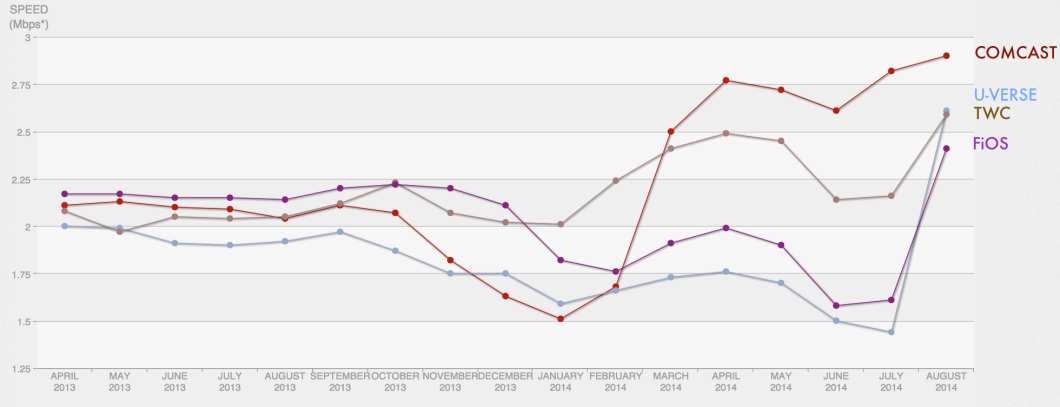Netflix Speeds Finally Rebound For FiOS, U-Verse Customers
 For years, Verizon has bragged about the fast data speeds available to subscribers of its FiOS broadband service. Meanwhile, the company was allowing Netflix streams to bottleneck, resulting in real downstream speeds that were slower than some DSL providers. And even months after Netflix agreed to pay Verizon for better access to its network, the speeds didn’t improve — until now.
For years, Verizon has bragged about the fast data speeds available to subscribers of its FiOS broadband service. Meanwhile, the company was allowing Netflix streams to bottleneck, resulting in real downstream speeds that were slower than some DSL providers. And even months after Netflix agreed to pay Verizon for better access to its network, the speeds didn’t improve — until now.
Netflix has released its monthly Speed Index report, and it finally shows improvement from both Verizon FiOS and AT&T’s U-Verse after about a year of declines that saw FiOS bottoming out at 1.58Mbps and U-Verse at 1.44Mbps — about half of what you’d need to stream a proper HD video on Netflix.
Both Verizon and AT&T reached deals earlier this year with Netflix that would give the streaming video service more direct access to the companies’ networks (for a price).
Netflix has also made similar deals with Comcast and Time Warner Cable, though those agreements resulted in improved speeds almost immediately after the deals were made. The Verizon and AT&T pay-for-access deals dragged on for several months; and the spat between Netflix and Verizon resulted in some public finger-pointing, with Netflix trying to place the blame on the ISP for continued slow connections.
In June, FCC Chair Tom Wheeler requested information on these paid-peering deals from both Netflix and the ISPs.
“Consumers pay their ISP and they pay content providers like Hulu, Netflix or Amazon. Then when they don’t get good service they wonder what is going on,” wrote Wheeler at the time. “Consumers must get what they pay for. As the consumer’s representative we need to know what is going on.”
Want more consumer news? Visit our parent organization, Consumer Reports, for the latest on scams, recalls, and other consumer issues.

